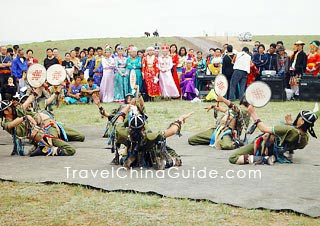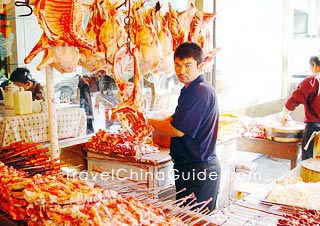Chinese Ethnic Minority Festivals
Brief Introduction
China is a large country with 55 ethnic minorities. Because of the differences in living environments, history and customs, characteristic festivals are held by the ethnic groups besides the Chinese New Year and Mid-Autumn Festival that the Han Chinese celebrate. All these traditional ethnic minority festivals are regarded as indispensable components of the minorities' customs.
It is estimated that more than 1,200 of the 1,700 Chinese festivals belong to the ethnic minorities. Each of them is based on its own origin or legend, and a single festival can also have different origins. Some of them are related to religions and beliefs, such as the Corban and Kaizhai Festival, whereas others are linked to entertainment activities, such as the Nadam Fair of Mongolia and the Tibetan New Year.
Some of the ethnic minority festivals are so grand and influential that they attract spectators from far away. The following are some of the representative ones:
| Festival | Ethnic Minority | Date | |
|---|---|---|---|
| Water-Splashing Festival | Dai | April 14th to 16th | |
| Torch Festival | Yi, Bai, Naxi, etc. | 24th to 26th day of the sixth lunar month | |
| Knife-Pole Festival | Lisu | 2nd day of the second lunar month | |
| Bullfight Festival | Miao | 25th day of the first lunar month | |
| Adult Ceremony | Jino | The day girls turn 15 years old and boys 16 years old | |
| March Fair | Bai, Yi, Hui, Zang, etc | 15th to 21st day of the third lunar month | |
| Nadam Fair | Mongolian | July or August | |
| End of Ramadan | Hui, Uygur, Kazak, etc. | The beginning of the tenth month on the Islamic calendar | |
| Corban Festival | Hui, Uygur, Kazak, etc. | The tenth day of the twelfth month on the Islamic calendar | |
Adult Ceremony of Jino
- the etiquette with the most national characteristics
Place: Yunnan Province
Activities: The Adult Ceremony, held upon a girl of the Jino ethnic minority reaching fifteen years old or a boy sixteen. To the Jino people, the ceremony is of such great importance as it indicates the transition from childhood into adulthood with both clothing and hairstyles are changed to indicate this fact.
When an Adult Ceremony is held, cattle are slaughtered to honor the ancestor. Two pouches of beef wrapped in the leaf of Japanese banana are placed before the youth and traditional epics are sung lead by the elders. Also at this time traditions, customs, moralities, etiquettes and some manufacturing skills of the Jino are passed on at this time, along with a set of laboring tools to the young boys. It is said that youths having attended the ceremony enjoy the right to love, and must take part in some youth organizations from where they can learn the codes of their villages.
March Fair of Bai
– the biggest merchandise trading pageant
Place: Yunnan Province
Activities: Held at the foot of Mt.Cangshan in Dali, Yunnan Province, the March Fair is the traditional grand event for Bai ethnic minority and is renowned as a pageant for trading merchandise. Originally held for reciting the lections and offering sacrifice to Kwan-yin (a female Bodhisattva), it has now become a thriving fair that tens of thousands people from different regions attend.
In the fair, all kinds of merchandises are available such as medicinal ingredients, teas, livestock, and other goods for daily use. Besides, Street for Foreigners and Street of Local Foods are also set up offering even more unique crafts and delicious foods to tempt and delight visitors. Not only can people trade goods with each other, the fair is also full of rich and colorful activities including singing, dancing, horse races, wrestling, flowers show and so on.
Nadam Fair of the Mongolian
 |
| Dance, Nadam Fair of the Mongolian |
Date: Between July and August every year
Place: Inner Mongolia
Activities: Nadam means 'entertainment or game' in Mongolian and Nadam Fair is the annual traditional pageant for Mongolians held in summer during which period the grass is green and the livestock stout and strong. In history, Nadam Fair was held for large-scale sacrificial activities and to pray for blessings from Manito. Now, activities like wrestling, horseracing, and archery (the three skills all Mongolian men should master) are the primary role of the fair. Besides, track and field sports, tug-of-war, basketball and volleyball matches are relatively new additions making the fair even more interesting. The fair finishes with a bonfire party during the night when the young people singing and dancing.
End of Ramadan
Place: Ningxia Hui Autonomous Region, Xinjiang and Gansu Provinces etc.
Activities: According to the Islamic calendar, the ninth month is the fasting month of Ramadan. During this month, every Muslim must eat breakfast before sunrise. Food and water are not allowed until after sunset. After 29 or 30 days of fasting comes the traditional End of Ramadan Festival which lasts three days from the first day of the tenth month of the Islamic calendar.
On the first day of the festival, houses are cleaned in the early morning. Muslims will go to mosques to pray toward Mekka (halidom of Islamism) after bathing. No matter what kind of weather, Muslims must perform this ritual. Visiting the graves of ancestors to mourn for them is also a must. Traditional festival food is prepared along with rich and colorful activities such as the lion dance, wrestling etc.
Corban Festival
 |
| Corban Festival |
Date: the tenth day of the twelfth month on the Islamic calendar
Place: Ningxia Hui Autonomous Region, Xinjiang Province and Gansu Province etc.
Activities: Held mainly by the Hui, Uygur, Kazak, Uzbek, Tajik, Tatar, Kirgiz, Salar, Dongxiang, and Bonan minority groups, the Korban or 'Zaisheng Festival' is one of the most important annual events. Before daybreak, houses are thoroughly cleaned, and different kinds of traditional cakes are made. On the day of this festival, Muslims don neat clothes after bath in the morning and then go to the mosque of which the scale is the grandest.
Livestock such as sheep, camel, and ox are slaughtered to present to relatives, friends, and guests. The name of 'Zaisheng Festival' is given. Besides, people gather together to eat mutton, cakes, fruits and other delicious food while chatting with each other. Activities differ according to different minority groups. Singing and dancing assemblies are held among the Uygur in Xinjiang Province. Activities like horseracing and wrestling are held among the Kazak, Uzbek, Tajik and Kirgiz minorities. No matter what the method of celebration, the day of Corban festival is full of interests and delight.
|
|